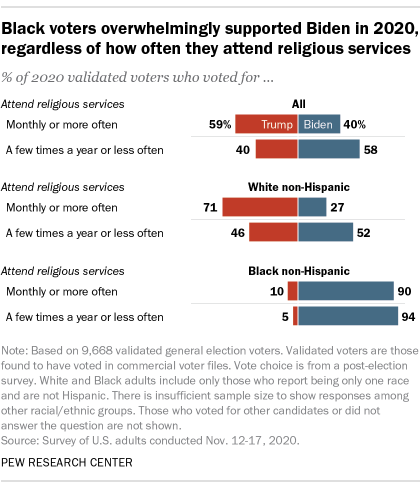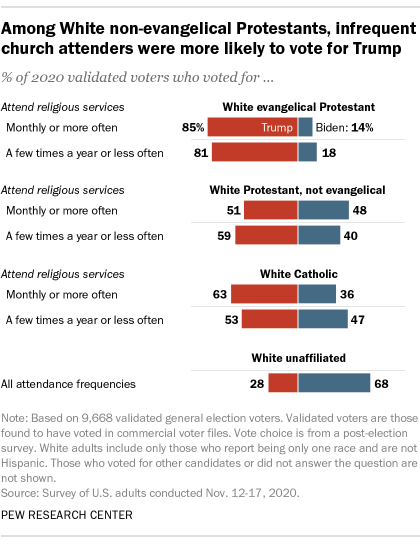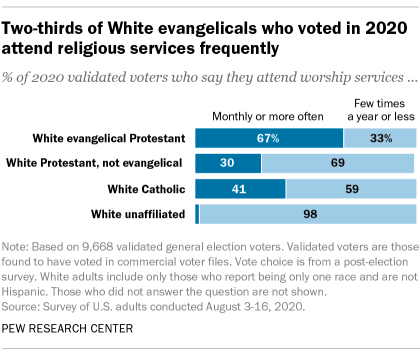Are Most White Nationalists Registered Democrats?
Like to past elections, faith played an important role in the 2020 U.S. presidential competition: Republican candidate Donald Trump continued to garner strong support from White evangelical Protestants, while Black Protestants and the religiously unaffiliated backed the Democratic candidate and eventual winner, President Joe Biden.

Simply religious identity alone does not tell the whole story. Among White Americans, worship service omnipresence remains highly correlated with presidential vote choice, co-ordinate to a new Pew Research Heart analysis of 2020 validated voters.
Equally in previous years, voters who frequently go to religious services – divers every bit those who attend at least monthly – were more than probable to vote for the Republican candidate in the nigh recent presidential ballot, while less frequent attenders were more likely to back the Democrat.
Pew Research Centre conducted this analysis to better understand the connections between organized religion and Americans' voting patterns in the 2020 election. Information technology is based on data from the Center's June 2021 report, which surveyed U.Due south. adults online and verified their turnout in the 2016 and 2020 elections using commercial voter files that aggregate official land turnout records. Panelists for whom a record of voting was located are considered validated voters; all others are presumed not to have voted.
We surveyed 11,818 U.S. adults online in November 2020, and iv,183 adults in November and December 2016. The surveys were supplemented with measures taken from annual recruitment and profile surveys conducted in 2020. Everyone who took part is a member of the Center's American Trends Panel (ATP), an online survey panel recruited through national, random sampling of telephone numbers or, since 2018, residential addresses. This mode about all U.S. adults have a take a chance of selection. The surveys are weighted to be representative of the U.Southward. adult population by gender, race, ethnicity, partisan affiliation, instruction, turnout and vote choice in the 2016 and 2020 elections, and many other characteristics.
Read more nigh the ATP's methodology. Hither are the questions used for this written report, forth with responses, and its methodology.
Overall, 59% of voters who frequently attend religious services cast their ballot for Trump, while xl% chose Biden. Among those who attend services a few times a twelvemonth or less, the blueprint was almost exactly reversed: 58% picked Biden, while 40% voted for Trump.
Withal, these patterns vary by race. Frequent religious service attenders' preference for Trump was apparent among White voters but largely absent amongst Black voters. (Due to limitations in sample size, results amidst Hispanic and Asian Americans could not be analyzed separately.)
Nigh seven-in-ten White, non-Hispanic Americans who attend religious services at least monthly (71%) voted for Trump, while roughly a quarter (27%) voted for Biden. Amongst White Americans who attend religious services a few times a yr or less, far fewer voted for Trump (46%), while around one-half (52%) voted for Biden.

Among Black, non-Hispanic adults in the U.S., by comparison, in that location is no such link between omnipresence and vote choice. 9-in-ten Black Americans who attend religious services monthly or more than voted for Biden in 2020, as did a similar share of Black voters who nourish services less oft (94%). But ten% of Black frequent attenders and 5% of Black exceptional attenders voted for Trump.
Amid White Americans, the extent to which vote selection is tied to frequency of religious service omnipresence differs by amalgamation.
White evangelical Protestants have been among the Republican Party'south most loyal constituencies, and this remained truthful in 2020. More than viii-in-ten White evangelical Protestant voters who attend religious services frequently (85%) voted for Trump in the most recent election, every bit did 81% of those who attend less frequently. White evangelical Protestants tend to be more religious than other Christians by a number of measures, including in their worship habits: Ii-thirds of White evangelical voters attend monthly or more often, while one-third attend less frequently.

White Protestants who are not evangelical, nonetheless, do vary in terms of the connection betwixt religious service attendance and voting for Trump. In 2020, White non-evangelical Protestants who nourish services less than monthly favored Trump over Biden, 59% to 40%. Merely among White non-evangelicals who nourish services more frequently, the vote was almost evenly divided, with 51% favoring Trump and 48% favoring Biden. White Protestants who are not evangelical tend to attend church less frequently than their evangelical counterparts: Iii-in-ten White not-evangelical Protestant validated voters say they become to church building monthly or more, while nearly 7-in-10 get a few times a twelvemonth or less.
White Catholics, meanwhile, follow yet another pattern. Near six-in-x White Catholics who attend Mass monthly or more often (63%) supported Trump in the 2020 election, while 36% supported Biden. Less frequent Mass attenders expressed less back up for Trump (53%) and more support for Biden (47%).
Finally, there are White adults who are religiously unaffiliated, a grouping that makes up 26% of White voters overall. Historically, White "religious nones" – who tend to rarely attend religious services – have been trending toward the Democratic Party, a pattern that persisted in 2020. Ii-thirds of White nones (68%) voted for Biden, while 28% voted for Trump. Most all surveyed members of this group (98%) fall into the infrequent attender category.
In improver to analyzing voters by frequency of worship attendance, the Center'southward validated voter study too shows how religious groups overall voted in the 2020 presidential race. Trump expanded his back up among White evangelical Protestants slightly, winning 84% of their vote in 2020 after receiving 77% in 2016, when he ran confronting Hillary Clinton. Trump held steady among White non-evangelical Protestants (57% support in both elections). He also received the votes of 57% of White Catholics, compared with 64% in 2016.
Biden, meanwhile, gained some basis among White Catholics, garnering 42% of that vote, or 11 points more Clinton did in 2016. What Biden lacked in support from White Christians, he made up for with support from Black Protestants and the religiously unaffiliated. An overwhelming majority of Blackness Protestants who voted last year (91%) supported the Democratic candidate, as did a large share of religiously unaffiliated voters (71%). Biden'south support was particularly strong among voters who identify as atheist or agnostic, with 86% of voters in this category backing him over Trump.

Biden also enjoyed a strong advantage amid voters belonging to non-Christian faiths – a grouping that consists of Jews, Muslims, Buddhists, Hindus, and others – with 64% of these voters supporting him. That is twice equally many every bit the share who supported Trump. (The survey did not take enough interviews with members of non-Christian faiths to report on each grouping separately).
Validated voters are members of the Center'southward American Trends Panel who are confirmed to have voted in the 2020 presidential election afterwards beingness matched to commercially available voter files. Read more than information about the methodology used in this analysis.
Note: Hither are the questions used for this report, along with responses, and its methodology.

Justin Nortey is a research banana focusing on religion research at Pew Enquiry Heart.
Are Most White Nationalists Registered Democrats?,
Source: https://www.pewresearch.org/fact-tank/2021/08/30/most-white-americans-who-regularly-attend-worship-services-voted-for-trump-in-2020/
Posted by: kaiseradioncy.blogspot.com


0 Response to "Are Most White Nationalists Registered Democrats?"
Post a Comment